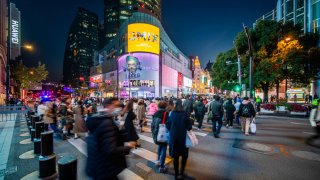- A study of affluent Chinese by Oliver Wyman found 22% were negative about the economy. It just exceeds the 21% seen in October 2022.
- Young people recorded the greatest drop in sentiment in May this year from April 2024.
- But many affluent Chinese are more keen to travel overseas than they were just before the pandemic.
BEIJING — China’s affluent are feeling just as poorly about the economy as they did during the pandemic.
Stream San Diego News for free, 24/7, wherever you are with NBC 7.
That’s according to a study of affluent Chinese released this month by consulting firm Oliver Wyman, which found 22% of respondents were negative about the economy when surveyed in May. It just exceeds the 21% seen in October 2022, just before Beijing announced plans to ease its stringent zero-Covid policy.
When asked about the five-year horizon, respondents were far less upbeat than they were back in 2022.
Get top local San Diego stories delivered to you every morning with our News Headlines newsletter.
“That to us is a fundamental shift in mindset,” Imke Wouters, partner at Oliver Wyman, told CNBC. “If you think, ‘I’m not having a good financial situation now,’ your spending, saving patterns will be very different.”
“The longer this [drags] on, the more negative they become about the long term future and the more cautious they come on spending,” Wouters said.
These findings come as China recorded a
slowdown in retail sales growth
, and
persistent deflationary pressure
as businesses slash prices to compete. Sliding prices in
property
, which accounts for the majority of household wealth, have also weighed on sentiment.
Money Report
Microsoft poaches more Google DeepMind AI talent as it beefs up Copilot
This EV loophole passes along a $7,500 tax credit without restrictions—here’s what to know
Oliver Wyman’s research was conducted from May 16 to 27. The firm has conducted similar surveys over the last three years. The latest study covered 2,000 households with a monthly income of over 30,000 yuan ($4,180).
That’s a fraction of consumers in China, where the per capita disposable income in urban areas for all of last year was 54,188 yuan. That’s far less than the
$64,474 reported for the U.S.
as of December.
Young people (aged 18 to 28) in the affluent income bracket who live in China’s largest cities were the most pessimistic of the four age categories, recording the greatest drop in sentiment in May this year from April 2024, the survey showed.
The unemployment rate for those aged 16 to 24 has remained in the mid-teens despite the overall jobless rate remaining far lower at around 5%.
Survey respondents aged 29 to 44 were the most optimistic, especially when it comes to their five-year outlook.
In China, most of the wealth sits with millennials and Gen X, Wouters said, referring to those broadly between the ages of 30 and 60. She attributed their relative optimism to higher levels of accumulated wealth and job stability, as well as the sense that the “good old days” might return — a perspective she suggested might come with age.
China’s official consumer confidence index has remained depressed since hitting a record low of 85 in November 2022, when China
restricted movement
in an effort to
prevent Covid-19 outbreaks
. The latest print was 88 as of May, according to the latest available data from the National Bureau of Statistics, accessed via Wind Information.
People in China have become significantly discouraged by perceived ”
unequal opportunity,
” which in 2023 became the No. 1 reason respondents believe people are poor, jumping from No. 6 nearly two decades ago. That’s according to the latest survey conducted in 2023 by a team of researchers led by Martin King Whyte of Harvard University and Scott Rozelle of Stanford University, who have been monitoring the shifts since 2004.
The survey found that across all income brackets, more respondents thought their families’ economic situation had declined in 2023 compared with previous years.
But despite their negative sentiment on the economy, many affluent Chinese are more keen to travel internationally than they were just before the pandemic.
Rather than spending on a luxury product, for example, they would rather “spend on something that can make [them feel] better now,” Wouters said.
“You just want to enjoy the moment,” she said.
Oliver Wyman predicts the share of affluent Chinese traveling internationally this year will reach 37%, above the 32% level seen in 2019, before the pandemic. So far, 27% of respondents have already traveled abroad, with 10% more expected to make a trip later this year.
Still, affluent Chinese aren’t necessarily traveling back to pre-pandemic hot spots such as the United States, the report said, noting that they are sticking closer to home instead. Chinese travel to Malaysia and Japan has already made a full recovery to 2019 levels, Oliver Wyman’s analysis showed.
Also on CNBC
-
Clout wars: Jensen Huang eclipses Elon Musk and Tim Cook in Washington
-
U.S. firms scramble to secure rare-earth magnets — imports from China surge 660%
-
The silver lining of positive earnings could be too blinding







